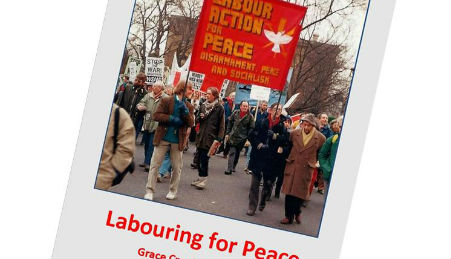 Labouring for Peace, by Rosalie Huzzard and Grace Crookall-Greening is a history of Labour Action for Peace; a campaigning group within the Labour Party.
Labouring for Peace, by Rosalie Huzzard and Grace Crookall-Greening is a history of Labour Action for Peace; a campaigning group within the Labour Party.
It started as a Pacifist Organisation in World War I as ‘Labour Pacifist Fellowship.’ Afterwards it was joined by non-pacifists and it changed its name to ‘Labour Peace Fellowship’ and ultimately ‘Labour Action for Peace’ . This happened when the MP Frank Allaun had a leading role in it, joining that consistent worker for peace and nuclear disarmament, Ron Huzzard. Labour Action for Peace became part of the ongoing campaign in the Labour Party for unilateral nuclear disarmament and a sane foreign policy based on the principles of the United Nations Charter.
The book starts with a tribute to Frank Allaun by former Labour MEP, Stan Newens and to Ron Huzzard by former Labour Party General Secretary, Jim Mortimer. It then details the history of the campaign and its relations with the Labour Party.
It is an interesting book which deserves a wide circulation . However, I have two criticisms of its general approach.
Firstly, it understates the connection between the struggle for a sane anti-nuclear policy with the struggle for inner-party democracy. The Tories have always believed that it is all right for the electorate to choose between the alternatives put before it every four or five years but that these alternatives must be determined and shaped by so called ‘experts’. This belief is shared by many establishment minded people, including most Liberals and the Labour Party right. Tony Blair adheres to this approach. Yet from the days of Keir Hardie the majority of the Labour Party has believed that the citizen has the right to shape these alternatives. In the Seventies we made some progress towards this. The very success of CND, Labour CND and Labour Action for Peace to commit party conferences to unilateral nuclear disarmament helped to make ‘New Labour’ more resolute to destroy the power of Labour Party Conference in accordance with the old anarchist slogan : “If voting meant anything they would not allow you to do it.”
At the time of writing this (January 2012) Ed Milliband’s initial attempts to re-establish the power of conference and to revise Labour’s nuclear policy have both been temporarily shelved. But the struggle for both can and must be the norm. The Labour Party issued in October 2011 a statement ‘Britain’s role in the World’, which does not mention Britain’s nuclear weapons and advocates ‘Liberal Internationalism’ . Individuals and Parties should send in their comments.
Secondly, there are grounds for hope. There has never been a time when there has been such interest in world affairs and foreign policy like the present. Neither nuclear weapons or Britain’s adventures in Iraq, Afghanistan or Libya have popular support. There, however, is a feeling of impotence. We have to convince people they have power if only they are prepared to use it.
The struggle continues. We have no right to opt out. With the perseverance exemplified in this challenging book we shall win.
Walter Wolfgang.
Copies of Labouring for Peace are available £6.75 including postage and packaging from:
Richard Hart, 94 Newbury Road, Bromley, Kent, BR2 0QW.
Email: rhart45 [at] hotmail.co.uk
Home: 020 8290 5325
Mobile: 07729 263 226

